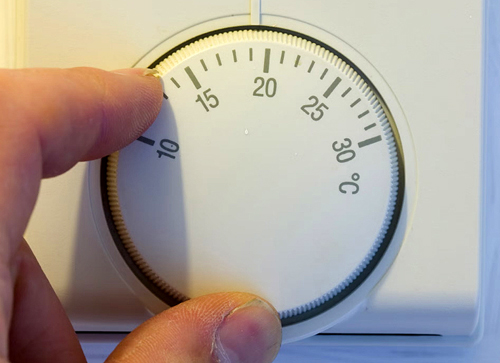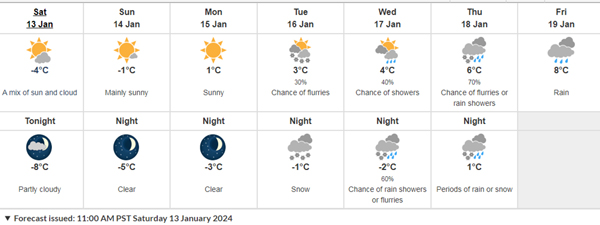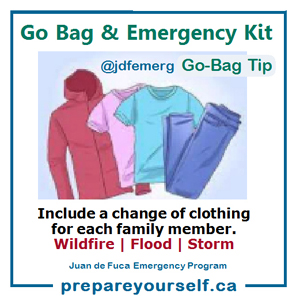Saturday January 13, 2024 | LANGFORD, BC [Updated January 14, 2024]
by Mary P Brooke | Island Social Trends
When it’s cold, electricity usage goes up.
Apparently the electricity usage on the cold snowy evening Thursday January 11 was 10,300 megawatts (MW) last night. Not quite a record-breaking usage level says BC Hydro, but close.
UPDATE: But on Friday night January 12 usage did break a record — reaching 11,300 MW, according to BC Hydro in an information bulletin on January 14.
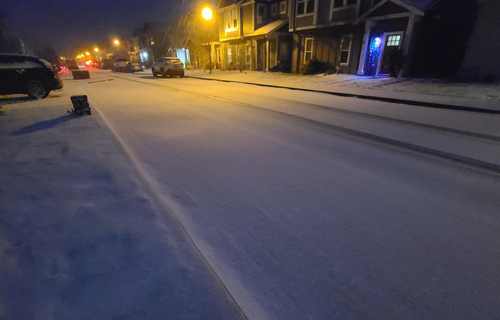
Households and businesses use various appliances and equipment for heat when the weather is cold. As well, people are staying indoors more during cold weather and likely using more indoor electrical appliances including electronics as well as lighting for longer periods due to dark evenings.
“We expect demand will peak this evening (Friday January 12) and remain high over the next few days,” said BC Hydro media rep Mora Scott in a statement to Island Social Trends on January 11.
“BC Hydro records the highest demand for electricity in the winter months during the coldest and darkest days of the year,” says Scott.
UPDATE: With the cold snap expected to last a couple more days, demand will remain higher-than-average, but now after the January 12 peak, BC Hydro does not expect to see any further record-breaking levels in the next few days.
Winter usage records:
The January 11 usage wasn’t as high as seen in some colder stretches of weather in 2020, 2021 and 2022.
- In December 2022 a new winter usage record was set at 10,977 MW, says BC Hydro. That was during the cold winter weather with snowfall Dec 19 to 21 in 2022 and cold weather lasting to December 23 and beyond.
- Back on December 27, 2021 a peak was set between 5 and 6 pm when demand for electricity hit what was then an all-time high of 10,902 MW.
- In 2020 there was a peak usage of 10,577 MW (on January 14, 2020 at 6 pm) which broke the previous records of 10,302 MW set on January 13, 2020 and 10,194 MW set on January 3, 2017.
Sub-zero temperatures for the next few days:
Sub-zero temperatures are expected though until Monday. Today’s high in Greater Victoria is -3°C with a low of -6°C expected this evening. Sunday’s low (January 14) is forecasted as -4°C and Monday’s low (January 15) as -3°C.
Above-zero daytime temperatures are expected to return starting Tuesday (January 16), with nighttime temperatures still expected to fall below zero on Tuesday and Wednesday evenings.
See Environment Canada Forecast – Victoria.
Summer cooling:
When it comes to electricity usage, peaks are starting to be paid attention to in summer months as well.
During the heat dome in June 2021 the daily usage of electricity in BC hit 8.516 MW on June 28. That’s about three-quarters of winter daily usage peak loads, says BC Hydro.
High usage in summer 2021 was seen on three consecutive days: 7,972 MW used on June 26 during the first full day of the heat dome in BC, and then 8,106 MW on June 27, and 8,516 MW on June 28. [See Winter Usage Higher than Summer in a December 27, 2021 article by Island Social Trends]
Power outages:
There were a lot of power outages on Tuesday January 9 due to winds and heavy rainfall on south Vancouver Island (mostly in coastal areas) and some smaller urban areas impacted with outages on January 10 and 11.
Outage preparation:
BC Hydro provides information on power outage and storm safety preparation on their website.
Prepare your home including emergency kit and outage plan | Prepare your business including emergency kit and info to employees.
Statement from the Minister responsible for BC Hydro:
UPDATE: “Extreme weather events like drought and cold snaps are putting people and communities at increased risk,” said Josie Osborne, Minister of Energy, Mines and Low Carbon Innovation, in a statement on January 14.
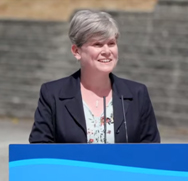
“Thanks to the resiliency of our energy system and exceptional planning by BC Hydro, we are able to meet the needs of British Columbians while also delivering clean, reliable hydro-electricity to our neighbours in Alberta when they needed it most,” said Osborne.
Statement from BC Hydro:
UPDATE: “B.C. is fortunate to have an integrated, provincial hydroelectric system that allows BC Hydro to ramp up quickly when generation is needed and scale back when it is not,” said Chris O’Riley, President and CEO, BC Hydro.
“Our teams carefully plan and prepare for cold weather events like this to ensure our generating facilities are running at full capacity so we can deliver clean electricity to our customers when they need it the most,” said O’Riley in a statement on January 14.
Winter safety preparation:
Winter safety preparation advisories have been issued by various levels of government, including by Provincial Health Officer Dr Bonnie Henry during her first media session of 2024 on January 10 — which was otherwise about the 2023-2024 respiratory illness season.
Wind chill was mentioned, and remembering to dress appropriately if going outdoors in cold weather.
Layers for safety:
In cold weather it’s best to dress in layers. The outer layer should be wind-resistant, says Jeri Grant of the Juan de Fuca Emergency Program.
Synthetic and wool fabrics provide good insulating properties.
Frostbite can develop within minutes on exposed skin, especially with a significantly low wind chill.

===== RELATED:
- Snow flurries coming after cold weekend (January 12, 2024)
- Arctic air brings snowfall to Greater Victoria (January 11, 2024)
- Jan 2024 respiratory season update emphasizes vaccination (January 10, 2024)
- South Vancouver Island power outages Jan 9 (January 9, 2024)
- BC Hydro peak winter usage on snowy Dec 27 (December 28, 2021)
- Meteorologist tells UBCM: heat dome was no surprise (September 15, 2021)


